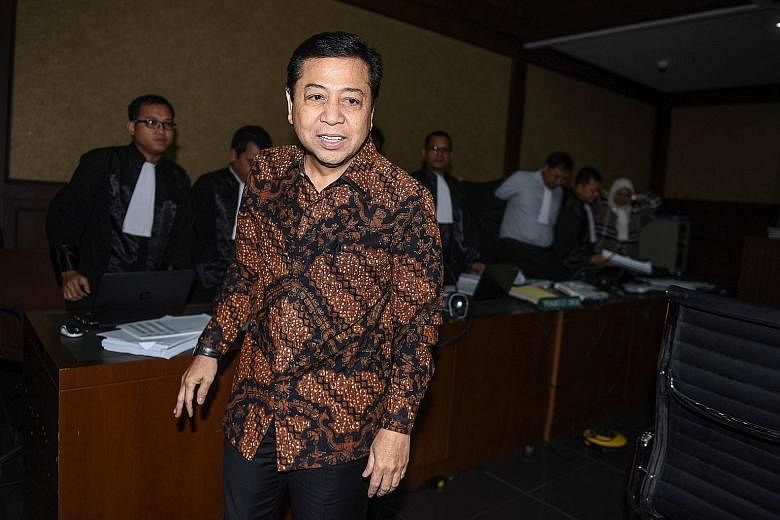Singapore companies operating in Indonesia often face a dilemma amid a culture of corruption in many of the country's outlying regions, where giving bribes is considered a norm. Avoiding it means they would never get things done.
One option is to take the middle way, which is to turn a blind eye and let local partners do the "trick", according to a Singapore company executive operating a business in Indonesia. This is despite the strict anti-corrupt practices back home in Singapore.
Illustrating his point, the executive recalls that his joint venture company once requested that local police open a main road's concrete median barrier to provide U-turn access outside a plant. This was to ensure logistic efficiency as well as customer convenience. The JV did manage to get what it needed, but this took "a while", he says.
"We divide tasks with our local partner. We leave certain technical challenges to them," says the Singaporean executive, who spoke on condition of anonymity. Any expenditure in the form of "extra fees" would appear on the JV's financial statement among normal operational expenses.
A business analyst says such "grey expenditure" can also be recorded as legal fees. "Say the real lawyer's fee is 500 million rupiah (S$49,420), a company could pay triple that, with an unwritten understanding the extra funds would be used to bribe rogue judges (and) police investigators," he says, citing cases he knew.
One example was a foreign insurance company that had a huge legal tussle with its local partner.
It hired a well-connected lawyer, paid him four billion rupiah, effectively giving him room to use the money to pay bribes. There is no standard amount for legal fees, but for this case, the normal fees could have been between 500 million rupiah and one billion rupiah, the business analyst says.
An executive of a Singapore-based oil palm plantation company says: "Corruption is one of the biggest issues for Indonesia, (and) will hamper its faster growth. It is deeply rooted inside the entire bureaucracy system - you need to pay bribes at all levels to get any kind of work done. There are times when, even after paying bribes, your work is not done."
Non-Singaporean multinational firms have been in the news for corruption cases.
In 2014, a Jakarta court ruled that a consortium of French rail company Alstom Power and Japanese conglomerate Marubeni Corp gave US$357,000 cash "gratification" through their consultant to Emir Moeis, deputy chairman of Parliament's Energy Committee, after winning a power plant tender in Sumatra's Lampung province.
Emir was sentenced to three years' jail, while investigations into the foreign companies - which denied the payment was gratification - were discontinued.
In 2005, US-based agrochemical firm Monsanto was charged with making US$700,000 in illicit payments to at least 140 Indonesian government officials and their family members, according to the US Securities and Exchange Commission. This was to get support to supply transgenic cotton seeds in South Sulawesi province in 2001.
For violating the US Foreign Corrupt Practice Act, Monsanto paid a US$1.5 million penalty to settle the bribe charges.
But not all businesses face such challenges. Mr Jason Lim, founder of Singapore online gaming and e-commerce start-up Yogrt, which has over eight million users in Indonesia, tells Insight: "My business is mostly online. We have very minimal contact with government agencies. Our experience with government agencies like BKPM (the national Investment Coordinating Board) and BI (Bank Indonesia, the central bank) have been very professional so far."
Singapore firms invest in sectors ranging from oil palm plantations and coal mines to ornamental fish.
Last month, President Joko Widodo expressed his frustration about the enormous number of elected officials arrested for corruption. Mr Joko revealed worrying data that 64 regents and 12 provincial governors have been arrested for corruption between 2004 and 2012, along with private individuals involved in the crimes.
Law enforcement officers have also arrested scores of Members of Parliament, court judges and even House Speaker Setya Novanto, who is standing trial in a major corruption case. "There are so many cases. I have lost count," Mr Joko said on Dec 11 in Jakarta at an event marking International Anti-corruption Day.
Mr Joko plans to issue a presidential regulation requiring local governments to put in a system where procurement is carried out online, accessible to the public. It requires vendors to upload products or equipment with complete specifications and asking prices.
The administration has also been cutting red tape in business licensing processes, as complicated procedures have created opportunities for bribery.
Mr Metta Dharmasaputra, of the supervisory board at Transparency International Indonesia, says: "Corporations now have to be extra careful because KPK (the Corruption Eradication Commission) and the government have committed to (targeting) them."


